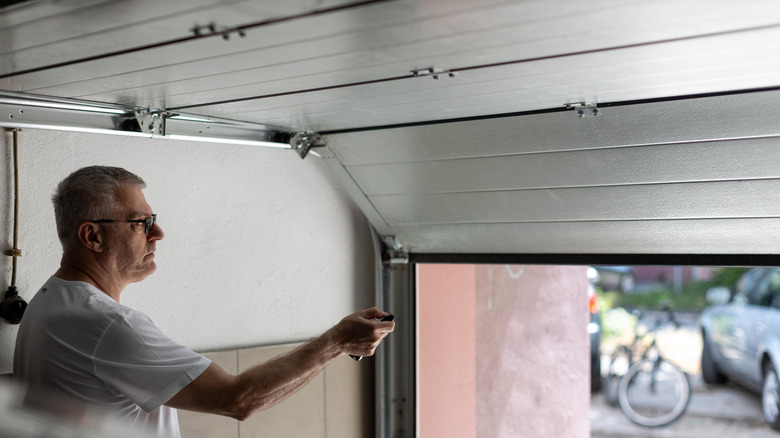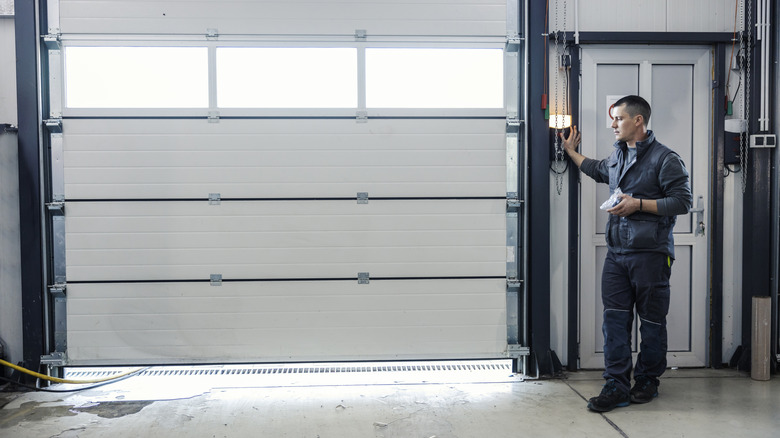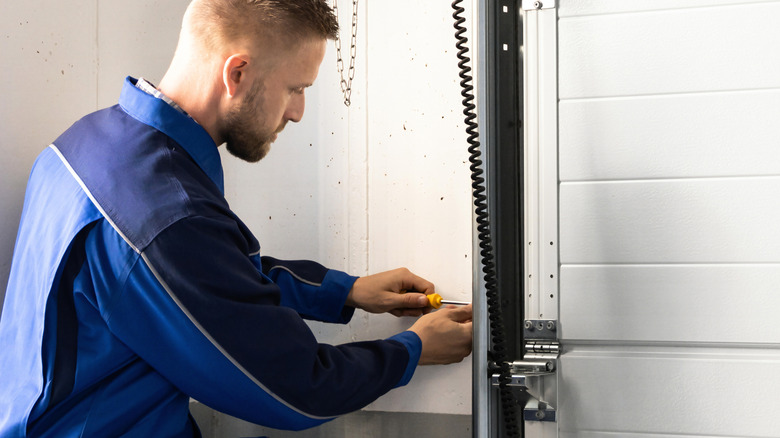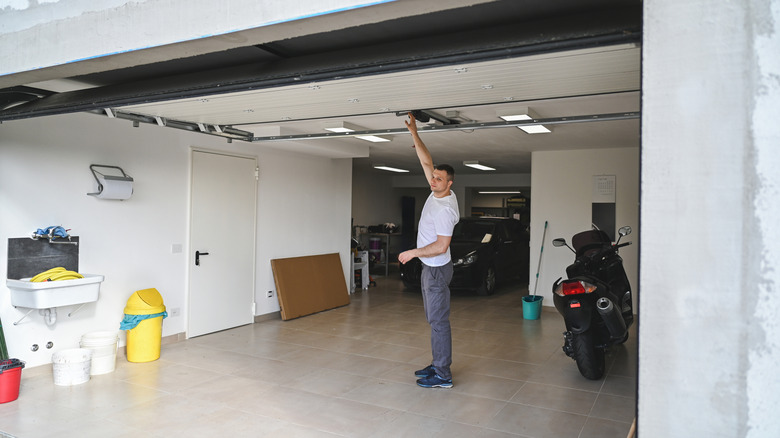What Horsepower Garage Door Opener Do You Need? Tips On Choosing The Right Type
For many years, most American homes have been built with cars in mind, so it's unsurprising that garages come with the package. In fact, even if you didn't have a car, you can still use your garage for other things, such as storage space or recreational activities like crafting or exercising. Regardless, there are plenty of reasons why you'd want to invest in making it easier to use on a day-to-day basis. Thankfully, we live in the future and there are plenty of essential garage gadgets to make your life better, from parking assistants to storage compartments and home battery setups. However, one item that you're bound to use often is the garage door opener.
These days, there are several types of garage door openers, including chain drive, belt-driven, wall-mounted, screw drive, and more. Depending on things like your personal preference, lifestyle, budget, and garage layout, the best kind of door opener may vary. But once you've chosen the ideal garage door and the type of garage door opener, the next thing that you need to figure out is the appropriate horsepower for your garage door opener. Here's how to choose the best one for you and why it can matter in the grand scheme of things.
Choosing the right horsepower for your garage door opener
It's important to note that several factors will influence the ideal garage door horsepower for your set, such as the width of the door in your garage, plus the material and the weight of your existing garage door. While there's no shortage of garage door openers in the market, there are typically three power levels: ⅓ hp, ½ hp, and ¾ hp.
Since it produces less power, the ⅓-hp opener is meant for lightweight doors in single car garages. If you don't plan to use your garage door that often or prefer to spend on other things, this might be a good cost-saving or temporary option. On the other hand, if you're looking for a garage door opener for your home, Lowe's mentions that the ½-hp option should do the trick in most cases. Because it is a little more powerful, it can keep up with a growing family's needs, especially if you're working with a two-car garage layout. But, if you've already invested in a large, heavy door for your forever home, you should be willing to shell out extra cash for a ¾-hp garage door opener that can handle the weight.
If you're unsure about the appropriate horsepower for your specific garage door, you may want to consult a professional for some personalized advice, such as the sales personnel or the manufacturer. While it can seem like a hassle, it can save you time, effort, and money in the future.
Why it matters to get the right horsepower for your garage door opener
Unsurprisingly, there are consequences to getting the wrong horsepower for a garage door opener. Although the wrong horsepower for your garage door opener can still work in the beginning, the imbalanced nature of the system will begin to reveal itself after extended use.
While you may think that bigger is always better, this isn't entirely true. Not only can an unnecessarily high-horsepower door opener waste energy, but it can also lead to unintended damage to your door and its surrounding areas. For example, it can go too hard or too fast when opening and closing, which can cause problems with the door panels and the overall alignment.
On the flip side, there's also a lot that can go wrong when you choose an underpowered garage door opener. When your garage door opener is overloaded, other mechanisms of your garage door, like the tracks and springs, may overcompensate. This can lead to issues, such as bending or jamming.
Whether your garage door opener is overpowered or underpowered, a common issue you'll encounter with both is unnecessary wear and tear, which can affect the overall longevity of your garage door system. In turn, it can also affect the existing safety mechanics within the door closer and lead to possible injury. That said, aside from the horsepower, there are some other factors that you should consider when choosing the right garage door opener for your peace of mind.
Other factors to consider when buying a garage door opener
Once you've nailed down the right amount of horsepower for your garage door opener, you'll probably be thinking about your budget. While it can appear straightforward to just consider the sticker price, don't forget to include the warranty and expected maintenance costs. If you live in an area with unstable electricity, it's also a good idea to take into consideration backup battery options. Then, you'll want to include your preferred method for opening and closing the garage door, whether it's with a remote or numeric keypad. If you have several cars or household members who are using the garage, you can consider getting an app-based remote system that allows for multiple users instead.
Lastly, there are now plenty of smart garage door options that are perfect for the tech-savvy homeowner. If you don't know where to start, you can check out our team's recommendations for the best Wi-Fi-connected garage door openers, which include the Tailwind iQ3, the Chamberlain MyQ GarageHub, and the LiftMaster Secure View Garage Door Opener.
Aside from being able to open and close your garage doors, some models also have features like HD cameras, added security measures, and smart assistant compatibility. But, if you're comfortable with coding, you can even program your own garage door opener with Raspberry Pi. You might even get inspired to try some of our other recommendations for useful Raspberry Pi projects for your garage too.



